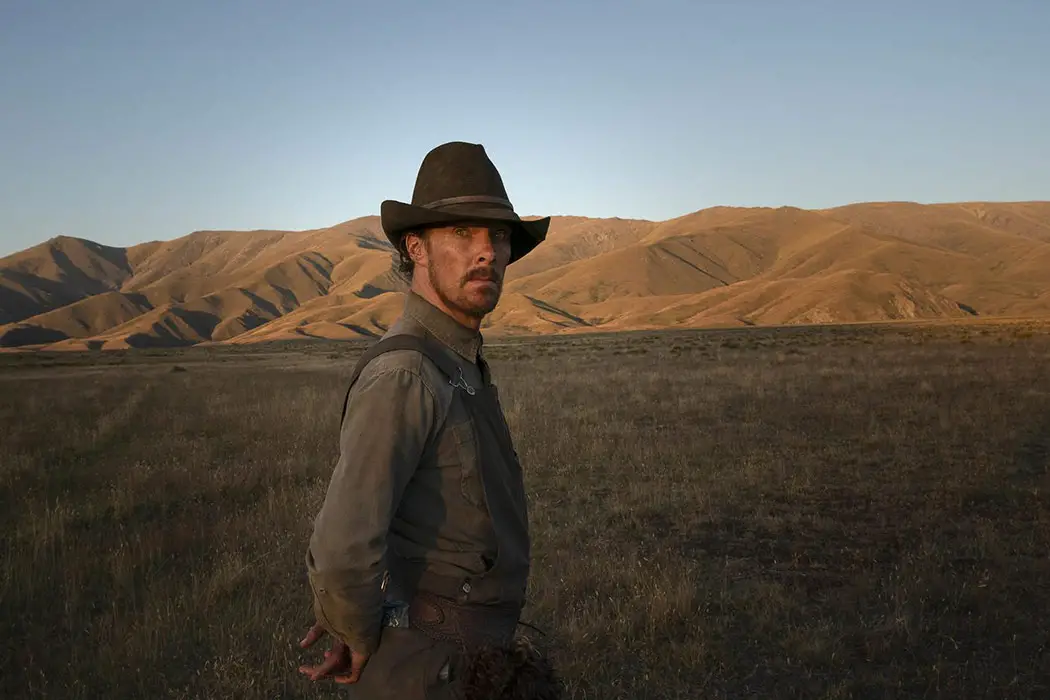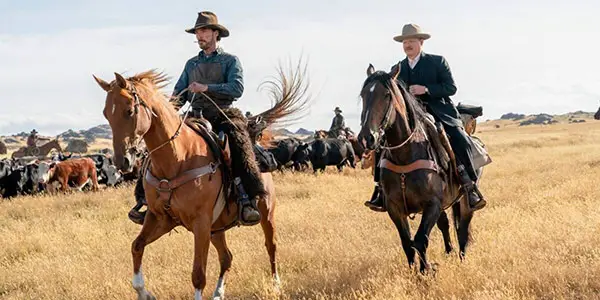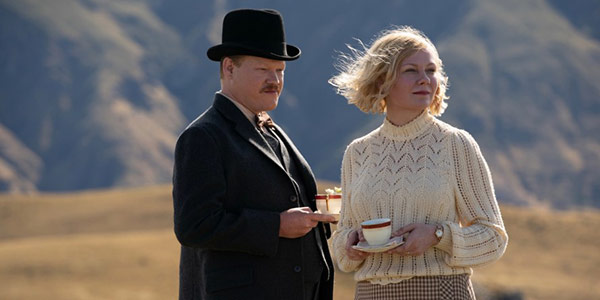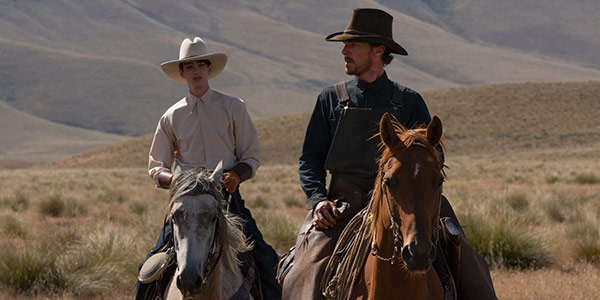THE POWER OF THE DOG: Jane Campion’s Solemn, Haunting Western is Among the Year’s Best

David is a film aficionado from Colchester, Connecticut. He enjoys…
It’s been nearly a decade since Jane Campion made a film, and nearly three(!) since she broke onto the scene with the Acadamy Award-winning The Piano. But in all that time, with films like An Angel at My Table and Bright Star, she never lost her touch. And with The Power of the Dog, it’s clear she’s still got it; it’s a revelatory film, with incredible performances, a haunting soundtrack, and a take on gender roles that is among the most profound of any recent film. In a time where movies appear to have been finally making a comeback, it is one of the year’s best.
Not Your Typical Western
Based on a novel by Thomas Savage, The Power of the Dog takes place in 1925 in Montana. It’s not quite the Old West, but there are remnants of it remaining, as well are indications of the modern world to come. The film focuses on a few select individuals. First, we see George Burbank (Jesse Plemons), an easy-going ranch owner, who is at odds with his gruff, grisly brother Phil (Benedict Cumberbatch). After a cattle drive, they come upon an inn owner named Rose Gordon (Kirsten Dunst) and her effeminate son Peter (Kodi Smit-McPhee). While Phil is brash and rude to them, George is much warmer, and soon finds himself attracted to Rose. Later, they marry, and Rose moves to live at the ranch that George owns with Phil. Phil, who immediately takes a disliking to Rose, finds himself at odds with her. And once her son comes to live with them during a break from school, things start to spiral out of control.

What may take some accustoming during a viewing of The Power of the Dog is its rather languid pace; though three acts can distinctly be made out (the film is also split into chapters), it still takes some time to get to its main purpose. But sly, subtle hints are planted throughout on the way to get there, which you may not even think twice about until a bigger revelation comes later on. Essentially, Campion‘s film is a slow-burner, gradually sinking its teeth into its audience as opposed to chomping down immediately. It’s so effective that you may not realize just how caught up in its spell you are until the film’s final moments. Stick around; it’ll be worth the wait.
Subverting Roles
One of the most defining attributes of The Power of the Dog, as it should be with almost any Western, is its sense of time and place. While the film takes place in an empty plain that looks straight out of the Old West, there are also signs of the developing industrial world, such as cars, plumbing, and electricity. Standing in-between two worlds is fitting, though, as that’s where most of our characters are as well. From the start, they initially seem straight out of a Western, especially Benedict Cumberbatch‘s Phil, with his long overalls, cowboy boots with spurs, and dirty complexion. You also have Kirsten Dunst‘s Rose, who seems like the calm, motherly type at the start. And Kodi Smit-McPhee‘s Peter appears to fit the role of an inexperienced adolescent, in need of some guidance from a more adept cowboy.
But it’s where Campion subverts these roles that make these characters that much more distinguished. You see subtle hints as to their true nature; as one example, the seemingly harmless Peter at one point cuts open a rabbit to examine its insides, claiming that he needs to learn how to do so if he wants to be a surgeon. As another, you see Phil continuously mock Peter for his lack of manliness, yet on his own, he seems much cleaner and softer, leading you to wonder if he is putting up a facade. Meanwhile, the level-headed Rose starts to lose her cool as a result of Phil’s brash nature, leading her down a dark path. People are never quite who they appear to be on the surface in The Power of the Dog, and Campion slowly but surely unravels who they truly are.

The characterization is made all the more effective by the performances of its central cast. Kodi Smit-McPhee, for one, who initially seems to be just a side character, soon gets a much larger role, showing the development of his character through his own sophisticated acting chops. While Kirsten Dunst, who doesn’t need to prove much, has a memorable performance as a do-good woman pushed beyond the edge of her sanity. Jesse Plemons (Dunst’s real-life husband) perhaps doesn’t get as much of a chance to shine here, as he steps aside to make way for the film’s final act, but he still stands on his own as a kindly man wishing to do well for both sides of his family.
It’s Benedict Cumberbatch, though, that provides the film with its most interesting character study. As an accomplished actor who is mainly known for his larger blockbuster roles, he continually stuns here, bringing forth the charisma, brashness, and subtleties necessary for the role, in a way that makes you hate his character but finding yourself unable to look away from his piercing gaze. It’s a powerhouse performance that will make you wish for more roles like this for the actor in the future.
Visual Flair and Use of Sound
While the performances of the cast are excellent, as is the story itself, it’s the way that Campion portrays these aspects that will get under your skin. She does this in a few unique ways. For one, the lighting of the film is mostly muted; much of it is portrayed from within the confines of a few select households, and mainly one in particular: that of the Burbank ranch. When we do step outside, the camera doesn’t focus on the landscape with a sense of awe, but instead that of uncertainty, showing tight closeups of characters’ faces, odd camera angles, and slow-motion shots. Even a wide shot of the hills beyond is coupled with a sense of dread. Perhaps, as with the characters themselves, things aren’t quite what they seem out here. And that’s the feeling that permeates throughout.
It would be amiss for me to not mention the sound as well. There are musical motifs repeated throughout, such as by Phil, who consistently hums a few notes of a song that Rose had been attempting on the piano as a way to mock her. Or something as simple as the noises of the bristle of a comb being brushed, which can be grating. Rarely is there a quiet moment to be had in The Power of the Dog, and when there is, it’s that much eerier in contrast.

The score itself is composed by Jonny Greenwood, which contains a mixture of guitar strumming, grandiose orchestral pieces, and some offbeat sound effects. It creates an unsettling effect, where even character interactions that are seemingly innocent feel sinister in nature. At times, though, it is a bit overused, and this is perhaps the film’s only recognizable flaw. It occurs in a few moments, for example, leading up to the final climactic scene of the film, in which the score is still overpowering despite the fact that the moment should be more subtle in nature. Thankfully, other than this, it happens only a handful of times throughout the film, and as a whole, Greenwood‘s score is amongst his finest yet.
Conclusion
To conclude, The Power of the Dog is a haunting, powerful character study by Jane Campion. It doesn’t shout its overall intention, and indeed you may be scratching your head for some time afterward, but its whisper is one worthy of thundering applause. It may be among the most unsettling films of the year, as well as one of Jane Campion‘s career-best. The performances of its central actors are amongst their finest as well, in particular Benedict Cumberbatch, who is likely to see some attention come awards season. At any rate, this is a highlight of 2021, and not a film to be missed.
What are your thoughts on The Power of the Dog? Are you a fan of Jane Campion’s films?
The Power of the Dog is now available to watch on Netflix.
Watch The Power of the Dog
Does content like this matter to you?
Become a Member and support film journalism. Unlock access to all of Film Inquiry`s great articles. Join a community of like-minded readers who are passionate about cinema - get access to our private members Network, give back to independent filmmakers, and more.
David is a film aficionado from Colchester, Connecticut. He enjoys writing, reading, analyzing, and of course, watching movies. His favorite genres are westerns, crime dramas, horror, and sci-fis. He also enjoys binge-watching TV shows on Netflix.













